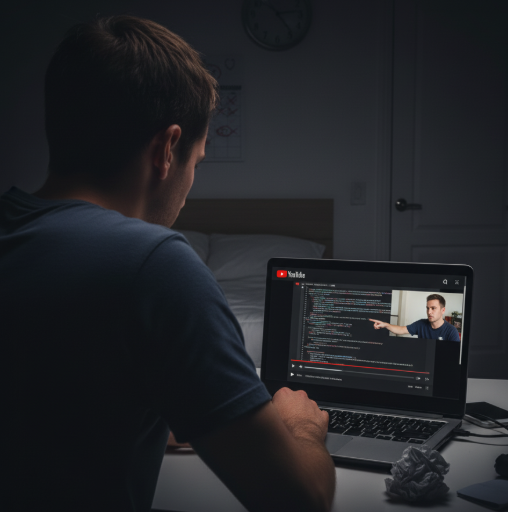My Real Coding Bootcamp Was a 20-Minute YouTube Video That Took Me Two Hours to Finish

My Real Coding Bootcamp Was a 20-Minute YouTube Video That Took Me Two Hours to Finish
I didn't learn to code at a university. I learned it by wrestling with deprecated libraries at 2 AM, and I have a handful of YouTube creators to thank for it.
I have a confession to make.
I am a self-taught, full-stack AI developer, and I have never paid for a coding bootcamp. My education didn't come with a certificate or a syllabus. It was forged in the messy, frustrating, and incredibly rewarding crucible of the internet.
It started, as it always does, with an idea. I had a list of things I wanted to build: a tool to scrape the Texas legislature, a database for regulatory filings, a resource for dads called "Rad Dad." I had the "what" and the "why," but a complete void when it came to the "how."
So, I did what my generation does. I went to YouTube.
I didn't know it at the time, but I was about to enroll in the most effective, albeit unofficial, coding bootcamp in the world. The curriculum wasn't structured, and the instructors didn't know I existed, but the lessons they taught me went far beyond mere syntax.
The First Breakthrough: When the Instructor Makes a Mistake
The first channel I stumbled upon was Sentdex. And if I ever meet the man behind it, I owe him a drink. It wasn't just his technical skill that was impressive; it was his authenticity.
Most coding tutorials are polished to perfection. The instructor types flawless code, everything runs on the first try, and a beautiful app emerges in 20 minutes. It's inspiring, but it's also a lie. It creates the dangerous illusion that coding is a seamless process, and when a beginner inevitably slams into their first cryptic error message, they feel a crushing sense of inadequacy. "Maybe I'm just not cut out for this."
Sentdex was different. He would make mistakes. And instead of editing them out, he would troubleshoot them on camera.
Sometimes he'd spend five minutes hunting for a typo. Other times, an entire video would be dedicated to the methodical, frustrating process of debugging a single line of code. For someone learning to code, this was like a drink of water in the desert. It was permission to fail. It was a live demonstration of the single most important skill in software development: The struggle is the work.
Debugging isn't an annoying interruption that gets in the way of coding. Debugging is coding. It's the job. Seeing a professional do it normalized the struggle and gave me the tenacity to push through my own errors.
The Real Curriculum: Deprecated Libraries and Stack Overflow
Armed with this new mindset, I developed a routine. I'd find a tutorial from my chosen "stack" of instructors - Sentdex, Traversy Media, and others - and I would code along, line by line.
It was a brutally slow process.
A 20-minute video would often take me two hours to complete. I'd pause, rewind, re-watch, and re-type. And more often than not, my code would break. The tutorial, being a year or two old, would be using an outdated version of a library. An import he used was now deprecated. A function he called now required a new argument.
These moments were incredibly painful. They forced me to leave the safe, guided path of the video and venture into the wilderness of the official documentation and the hallowed halls of Stack Overflow.
This is where the real learning happened.
The tutorial was the lecture; the deprecated library was the homework, the exam, and the final project all rolled into one. It forced me to stop copying and start problem-solving. It taught me how to read documentation, how to ask good questions, and how to understand not just the line of code I was writing, but the underlying concepts that made it work.
Every solved problem, every fixed dependency, was a small victory that built my confidence and my competence.
Paying it Forward
I am a product of the open-source ethos. My entire career is built on the foundation of knowledge shared freely and generously by people who were willing to take the time to teach. They didn't just teach me Python or Django; they taught me how to learn, how to persevere, and how to be a self-sufficient problem-solver.
My goal now is to pay that forward. While I hope to one day create my own open-source knowledge base, for now, I do my best to help anyone who has the interest to learn. I share my code, I sit side-by-side with them to debug a problem, and I point them to the same incredible resources that taught me.
Because the best way to thank the instructors who guided you is to become an instructor for someone else.